Scott Hicks No Reservations Interview
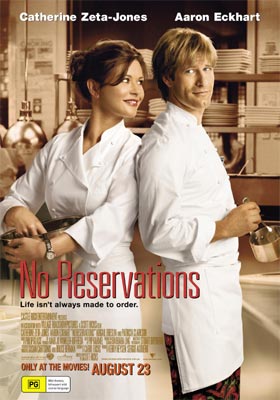
SCOTT HICKS RESERVES A TABLE IN HOLLYWOOD
by Paul Fischer in New York.
Australian director Scott Hicks has had quite the career since his Oscar winning Shine catapulted him to Hollywood success. With a resume that included a handful of TV-movies, a coming-of-age feature, a children's film and several TV documentaries, few might have thought he could craft such a mature, powerful study of a musician driven by his overbearing father and personal demons to the brink of madness and redeemed, in part, by love.
Hicks was born and raised in Australia and learned his craft as a production assistant and assistant director on several locally produced features. In 1981, he helmed his first full-length film, "Freedom!", a teenaged boy-meets-car story. Hicks' second feature, which he also scripted and produced, was "Sebastian and the Sparrow" (1988), which depicted the growing friendship between a wealthy, somewhat sissified teen and a homeless runaway. Visually stunning and acted by relative unknowns, the film won high praise in Australia.
By the mid-80s, Hicks had begun an association with the American cable network, The Discovery Channel, directing several acclaimed documentaries, including 1989's award-winning "The Great Wall of Iron", about the People's Liberation Army of China just before the Tianenman Square revolt. He co-wrote and directed the four-hour "Submarines: Sharks of Steel: The Hidden Threat" (The Discovery Channel, 1993), which earned him an Emmy Award. Other documentary credits include writing and directing "The Space Shuttle" (The Discovery Channel, 1994) and "The Ultimate Athlete: Pushing the Limit" (The Discovery Channel, 1996). In his homeland, Hicks worked on the TV miniseries "Finders Keepers" and the TV-movie "Call Me Mr. Brown".
But it was "Shine" that moved him to the ranks of A-list directors. Hicks first met David Helfgott around 1986 and scripted a draft of the story then. In 1992, screenwriter Jan Sardi teamed with Hicks to develop the project but finding the financing proved difficult, particularly after Hicks committed to using stage actor Geoffrey Rush in the leading role. After assembling a cadre of investors, Hicks brought his vision to the screen and received critical approbation and several trophies, including the Australian Film Institute Best Director Award and an Oscar nomination. His subsequent features included the diverse likes of Snow Falling on Cedars and Hearts in Atlantis, as well as numerous American commercials. His latest feature is No Reservations, based on the German film Mostly Martha. Hicks' remake is now set in New York with Catherine Zeta-Jones cast as a top-notch female chef whose life is turned upside-down when she must care of her niece after her sister is killed. She now has to adapt to a different lifestyle and uses food as a means to express her roller-coaster life. The film co-stars Aaron Eckhardt and Abigail Breslin.
Hicks talked 1:1 with Paul Fischer in New York.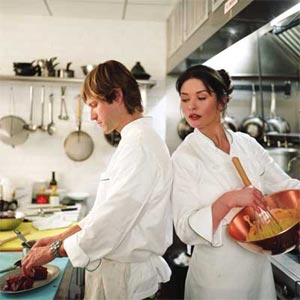 Paul Fischer: Now, I guess as they say in the classics, it's a long time between drinks. It's been a while since you had a movie in the can. Is it because you're selective or because it didn't feel right to do anything straight after the last one?
Paul Fischer: Now, I guess as they say in the classics, it's a long time between drinks. It's been a while since you had a movie in the can. Is it because you're selective or because it didn't feel right to do anything straight after the last one?
Scott Hicks: Well there are a number of reasons. One is that I just, after the last one, I just decided I wanted to spend a little more time at home and the long absences that you have when you're making a movie in another part of the world, I just wanted to take a little break from that. And also at the same time I got enticed into the world of American television commercials, which I found really very intriguing and fascinating. And it meant that I could come and go for short periods. So it filled a need in the sense of I wanted to spend more time at home.
Paul Fischer: And it's good money too right?
Scott Hicks: It was very well paid. And the best ideas are really wonderful to play with.
Paul Fischer: Do you like telling stories in such a short amount of time?
Scott Hicks: Absolutely. I mean it was like a new discipline.
Paul Fischer: What were some of your favourite commercials?
Scott Hicks: Gosh I did a bunch of things. I've done stuff for Mercedes, for Hyatt, for AT&T. I mean just all sorts of stuff and things that involved a cast and acting so that, you know, they were all things that sort of appealed to me in the sense of what the idea was. And you work with wonderful people, the best DPs, the best designers and the best of them are like sort of mini movies.
Paul Fischer: So when you made the decision to go back to pictures, what criteria were there in your mind that needed to be present?
Scott Hicks: Well nothing other than, you know, that the story appeals, is really the only thing. It's not like I'd go looking for something specific. And along the way, I mean there were one or two things that I wanted to do which I was either unable to get the right cast for or the studio didn't really have the sort of budget that it would have sustained. So there were things that I spent time trying to get air under the wings, you know what I mean, that didn't come off. And in fact what happened with No Reservations was that basically Warner Bros came to me and said 'Are you interesting in directing this film?' and 'Catherine is involved' and 'This is the budget and it's ready to go'. And I just thought 'I'm ready. I like the story. I'm ready to make a film. I'll do that.' So it sort of happened very easily in the end.
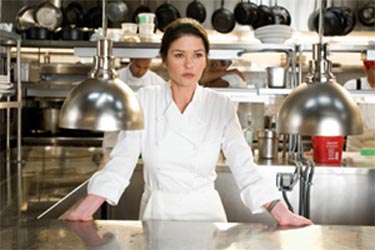 Paul Fischer: There is a consistency in your work, thematically, in which character is important to you.
Paul Fischer: There is a consistency in your work, thematically, in which character is important to you.Scott Hicks: Well the attraction was that it's about relationships and what was so surprising for me as a studio film was it was about three people trying to connect with each other. It was like a beautiful chamber piece. I loved the triangle of the relationships, the three relationships between Kate and Zoe and Nick and how Zoe comes into Kate's life as such an alien sort of character, and ends up being the go-between between her and Nick that she's not getting on with. And I like the dynamic of it. I thought it was very sweet and I thought it's a story worth telling.
Paul Fischer: What role does geography play in telling this story? I mean there could have been, more or less sort of told, you know, we can't afford to make this in New York.
Scott Hicks: Absolutely. They said 'Go to Toronto'. I said 'No.' They said 'You can't afford to do it'. So I said 'OK, if I can show you that we can do it ..' and they said 'Well prove it'. So I went through the exercise in budgeting with the producers and with, you know, my wife, Kerry, is a producer. And a few other production people, and we demonstrated to them that with a combination of the rebates that are offered in New York for filmmaking, together with the talent pool that really meant we could cast the movie entirely out of New York more or less. We actually brought in Jenny Wade from LA. And the crew. Whereas if we went to Toronto we'd be bringing a lot of people in probably. You know, you start to spend a lot of money to make Toronto look like New York. There's basically one street that you could get away with. And then of course you have that fantastic added value of having the real New York on the screen wherever you turn. And so they said 'OK. Great.' And in the end we actually came in under budget.
Paul Fischer: What kind of budget is there on a movie like this?
Scott Hicks: It's a kind of average studio picture, you know.
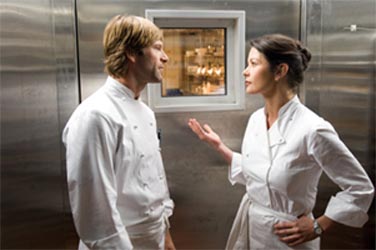 Paul Fischer: Does it give you a taste of working more now in features? Do you realise after having made No Reservations ....
Paul Fischer: Does it give you a taste of working more now in features? Do you realise after having made No Reservations ....Paul Fischer: Does it have a title?
Scott Hicks: At the moment it's just Glass: A Film by Scott Hicks, basically. But I don't really know whether that'll be what it is.
Paul Fischer: And what film are you working on next?
Scott Hicks: It's called, at the moment the working title is called The Boys are Back with Clive Owen, shooting in Australian and England.
Paul Fischer: Is it an Australian production?
Scott Hicks: It's a co-production, UK co-production.- the title is actually based on a memoir by Simon Carr about an English journalist.
Paul Fischer: Is it set in Australia?
Scott Hicks: Yeah it's set in Australia, with some components set in England.
Paul Fischer: How do you feel about working back in Australia - because that'll be the first time since Shine. Scott Hicks: I know. It'll be fantastic. I'm really looking forward to it. The interesting thing is I've done all of my post-production back in Australia for all of the American movies, which I really enjoy for personal reasons. But also because it means I can put money into the local industry which has been great. And that helps with infrastructure and other things as well. But this will be interesting now that I'll be shooting there.
Paul Fischer: What about working again with Geoffrey Rush?
Scott Hicks: Oh yeah, I'd love to. It's wonderful just watching what he's done with his opportunity, you know. He's just come into the most fantastic success through bold choices. You know, unpredictable but just what you would expect of him in a sense that he hasn't done what anybody else has told him to do. He's followed his own instincts. You know, it's so unexpected. I mean if you think about the variety of things that he's done since Shine. Fantastic.
 Paul Fischer: Now Shine of course in itself was an incredibly difficult film to get made. And there was a huge struggle to get that film made, the two of you. Yet its singular success must have astonished you right from the beginning.
Paul Fischer: Now Shine of course in itself was an incredibly difficult film to get made. And there was a huge struggle to get that film made, the two of you. Yet its singular success must have astonished you right from the beginning. Scott Hicks: Absolutely.
Paul Fischer: How surprised were you that that movie has led to this career?
Scott Hicks: Well at the time it just sort of bowled me over, of course. I mean nothing prepares you for that kind of response and reaction. It wouldn't matter whether you were the most ambitious filmmaker walking the earth. To have that happen in such an unexpected way is astonishing. And of course it completely changed the world. But that's now the world I occupy so it's become much more, you know, I'm not sort of constantly shocked by it anymore.
Paul Fischer: Do you look at that movie now and see it for what it was?
Scott Hicks: No I haven't looked at it for a long time. so I've no idea what it would say to me, really. I do know that, I felt when it was done it was the very best that I could do with everything that I had at that time. And that was enough. It turned out to be enough.
Paul Fischer: So having started out in documentaries, and now the Glass movie, was it a way for you to get back into non-fiction filmmaking?
Scott Hicks: Yeah, well I never turned my back on documentaries, it's just things haven't sort of beckoned. And then basically what happened was that I'd got to know Philip Glass a little bit and his management actually came to me a couple of years ago and said he turns seventy this year, 2007, and they'd thought about making a documentary about him. And I said 'Sure'. And it just became a part of this journey to - it's really taken me back to my roots to make it - I shot it myself actually.
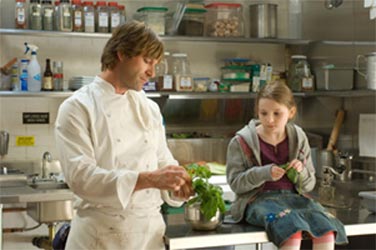 Paul Fischer: You can't make those movies except out of love. I mean there's no financial incentive to make movies like that.
Paul Fischer: You can't make those movies except out of love. I mean there's no financial incentive to make movies like that. Scott Hicks: Yeah. So it is a personal passion in a way. And I think, you know, because I hugely admire Philip and I love his work and ...
Paul Fischer: Music plays such a vital role in your work, with Shine obviously, and this movie is also partly about music.
Scott Hicks: Yeah that sort of eclectic ....
Paul Fischer: Yeah. Has music always interested you when you were growing up?
Scott Hicks: I asked my parents if I could have piano lessons - I don't know why, I mean when I was about nine. But you know what? I was lazy and I didn't really have the persistence and the aptitude and I regret that now. I learned it for a few years and I sometimes fantasise in my advancing middle age taking it up again.
Paul Fischer: Where did the filmmaker in you come from?
Scott Hicks: That's a complete mystery to me. I really don't know. I mean because it was never part of my childhood. It was never - I grew up in Kenya, there was not even a television there. I'd probably seen about ten movies by the time I was a teenager, seriously. And so it was never part of my world. So it was a complete series of accidents. I went to university. I was very young, I was sixteen when I started, and I was at drama. There were so many accidents that led to this I can't even explain why I'm having this conversation with you rather than teaching history to a bunch of uninterested year twelves.
All I'm saying is that something happened that opened a door for me that was completely unpredictable. I did drama, there was a tiny filmmaking part of that course.
Paul Fischer: Which university?
Scott Hicks: Flinders in South Australia. I just went through that door. It was the most interesting and fun thing to do with my friends. That was all. And it took over everything.
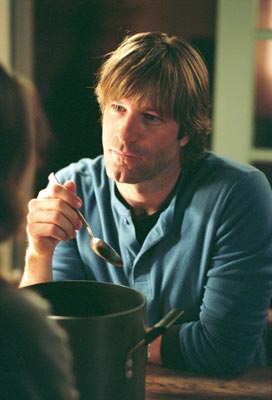 Paul Fischer: Did you expect to make a living out of it?
Paul Fischer: Did you expect to make a living out of it? Scott Hicks: No, I had not idea. 'How did you do that?' I don't know. I graduate with my Honours degree and I went out into the world and all I knew was the fun I had making films so I started trying to find out how you could do that. And then I started working on other peoples' movies. And it was a very good time - mid seventies. A lot of interesting filmmakers came to Adelaide, the new wave sort of ...
Paul Fischer: The new wave of Australian film, right.
Scott Hicks: Yeah. I got jobs on other peoples' films. And it's just like, you know, it became a career. A 'career', if you look it up in the dictionary, one of the definitions of career is an uncontrolled lurch downhill.
Paul Fischer: How was the journey from Kenya to Australia?
Scott Hicks: Oh that was via England. I left Kenya when I was about ten. I went to boarding school in England for a few years and then to Australia when I was fourteen and I've lived there ever since. Paul Fischer: What do you bring to movies like this one, as an Australian filmmaker as opposed to an American filmmaker?
Scott Hicks: I like to tell emotional stories but if possible to avoid completely falling over into total sentiment, or sort of mentality. And I think having a slightly - you know, I mean Australians have a somewhat different view of the world to Americans and I think you bring that sensibility, that there's a way to tell a story that can raise a tear without whacking on the violins. That's the aim is to try to tell it without overtly grinding every gear to get there. So maybe that's part of it. I don't really know.
Paul Fischer: Has the industry changed a lot since you started do you think?
Scott Hicks: Yeah. I'm aware of it, very much in the sense of so much resources gravitate to the colossal, the gargantuan sort of franchises that are the core, the real bread and butter for the studios I think. And what made it so refreshing with No Reservations coming through like this was to see that what was a delightful little German movie had to be translated into an American context.
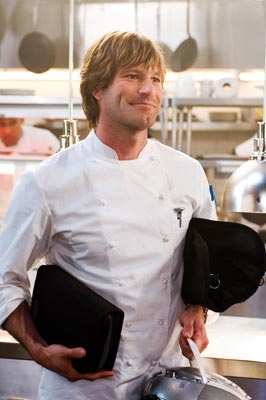 Paul Fischer: Are they very different, the two films?
Paul Fischer: Are they very different, the two films?Scott Hicks: I think so. I mean obviously the elements of the story are the same with some significant plot differences. Because the original - there were plot elements that related to the proximity of Germany to Italy and blah, blah, blah. There was a whole subplot in the other one to do with the little girl's father who just doesn't exist in our story. So there are significant differences which are to do with relocating it in a different culture. But of course the basis story line owes itself to the original.
Paul Fischer: I mean cynics might argue or might suggest that Hollywood finds it hard to come up with original material so they are going back to remaking a lot of films.
Scott Hicks: But it's a valid way, I mean retelling stories, films that are made over and over again.
Paul Fischer: Well Aaron is playing the same character in Batman that someone else has played.
Scott Hicks: Tommy Lee Jones. Exactly. Yeah. And of course last year Scorsese had brilliant success with a remake of The Departed. So it's part of, you know, there's adaptations from other sources and in a way this is another form of adaptation.
Paul Fischer: Is this the most creative you think you've been in your professional life now in terms of your career?
Scott Hicks: Well this has been a very creative period, yes, doing a feature film and a feature documentary and I'm still doing the commercials on and off in between so it's very busy.
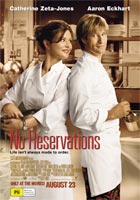
No Reservations
Starring: Academy Award® winner Catherine Zeta-Jones (Chicago), Golden Globe nominee Aaron Eckhart (Thank You for Smoking), SAG Award winner and Oscar® nominee Abigail Breslin (Little Miss Sunshine) and Academy Award® nominee Patricia Clarkson (Pieces of April).
Director: Scott Hicks
Rated: PG Mild themes, Infrequent mild coarse language
Running Time: 104 mins
Master chef Kate Armstrong (CATHERINE ZETA-JONES) lives her life like she runs the kitchen at upscale 22 Bleecker Restaurant in Manhattan - with a no-nonsense intensity that both captivates and intimidates everyone around her. With breathtaking precision, she powers through each hectic shift, coordinating hundreds of meals, preparing delicate sauces, seasoning and simmering each dish to absolute perfection.
Kate's perfectionist nature is put to the test when a brash new sous chef joins her staff, the high-spirited and freewheeling Nick Palmer (AARON ECKHART). A rising culinary star himself, Nick favors opera while working and loves to make everyone around him laugh. His casual approach to both life and cuisine couldn't be more different than Kate's, yet the chemistry between them is undeniable...as is the discord, like forks clanging off a granite countertop.
It might be easier to deal with this turbulence at work if Kate wasn't already off balance at home, struggling to connect with her nine-year-old niece, Zoe (ABIGAIL BRESLIN), who has recently - and very nexpectedly - come to live with her. A bright, perceptive child more comfortable with fish sticks than foie gras, Zoe is clearly out of place in Kate's routine but Kate is determined to make a home for her...just as soon as she figures out how.
If she wants to forge a real bond with Zoe, find happiness with Nick and rediscover her appetite for life, she will have to try something bold and new, and learn to express herself outside the realm of her kitchen. For Kate, that would be like trying to cook without a recipe.
In Cinemas 23rd August
www.noreservationsmovie.com
MORE
- Viggo Mortensen The Road
- 24 Cast Reunion
- Aaron Eckhardt No Reservations
- Aaron Eckhart The Dark Knight
- Adam McKay Step Brothers Interview
- Alan Alda Diminished Capacity Interview
- Alan Alda Diminished Capacity Interview
- Alex Dimitriades
- Al Pacino Oceans 13
- Alan Rickman Snow Cake
- Alan Rickman Sweeney Todd



